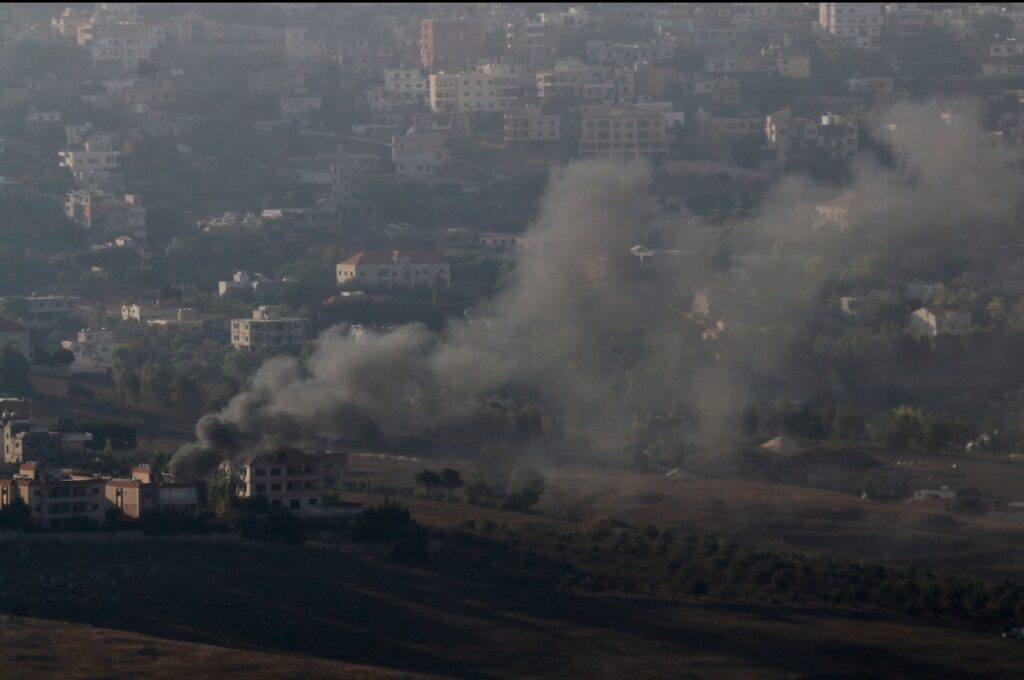Reuters

JERUSALEM/BEIRUT – Hezbollah launched hundreds of rockets and drones at Israel early on Sunday, as Israel’s military said it struck Lebanon with around 100 jets to thwart a larger attack, in one of the biggest clashes in more than 10 months of border warfare.
Missiles were visible curling up through the dawn sky, dark vapour trails behind them, as an air raid siren sounded in Israel and a distant blast lit the horizon, while smoke rose over houses in Khiam in southern Lebanon.
Any major spillover in the fighting, which began in parallel with the war in Gaza, risks morphing into a regional conflagration drawing in Hezbollah’s backer Iran and Israel’s main ally the United States.
With three deaths confirmed in Lebanon and one in Israel, both sides indicated they were happy to avoid further escalation for now, but warned that there could be more strikes to come.
Hezbollah leader Sayyed Hassan Nasrallah said the Iranian-backed group’s barrage, a reprisal for the assassination of senior commander Fuad Shukr last month, had been completed “as planned”.
However, the group would assess the impact of its strikes and “if the result is not enough, then we retain the right to respond another time”, he said.
Israel’s foreign minister said the country did not seek a full-scale war, but Prime Minister Benjamin Netanyahu warned: “This is not the end of the story.”
Earlier, Netanyahu had said: “We are determined to do everything we can to defend our country … whoever harms us – we harm him”.
The two sides have exchanged messages that neither wants to escalate further, with the main gist being that the exchange was “done”, two diplomats told Reuters.
Expectations of an escalation had risen since a missile strike in the Israeli-occupied Golan Heights last month killed 12 youngsters and the Israeli military assassinated Shukr in Beirut in response.
Hezbollah had delayed its retaliation to give time for ceasefire talks, and had calibrated its attack to avoid triggering a full-scale war, a Hezbollah official said.
DENSE BOMBARDMENT
Israel’s air strikes started before Hezbollah began its barrage, Nasrallah said. Netanyahu said these “pre-emptive” strikes had foiled a much larger Hezbollah barrage but Nasrallah said they had had little impact.
Hezbollah’s own rocket and drone strikes were focused on an intelligence base near Tel Aviv, Nasrallah said. Netanyahu said all the drones targeting what he called a strategic location in central Israel were intercepted.
A security source in Lebanon said at least 40 Israeli strikes had hit various towns in the country’s south in one of the densest bombardments since hostilities began in October.
Hezbollah said the strikes killed two of its fighters in al-Tiri. The Hezbollah-allied Shi’ite Muslim group Amal said a strike on Khiam killed one of its fighters.
Israel’s military said a naval soldier was killed and two wounded.
Lebanon’s caretaker prime minister Najib Mikati met cabinet ministers at a session of the national emergency committee.
Flights to and from Ben Gurion airport in Tel Aviv were suspended for around 90 minutes.
Some flights to and from Beirut were also halted, stranding passengers. “I just want to get out of here by any means possible,” said Rana Saade, a Lebanese woman living in New Jersey.
WARNING SIRENS
In northern Israel, warning sirens sounded and explosions were heard in several areas as Israel’s Iron Dome aerial defence system shot down rockets coming from southern Lebanon.
“Israel should, as it did this morning, deliver a pre-emptive strike. But if Hezbollah continues Israel should strike very hard to remove the threat from Hezbollah once and for all,” said Yuval Peleg, 73, from Haifa.
A resident of the southern Lebanese town of Zibqeen told Reuters he had awakened “to the sound of planes and the loud explosions of rockets – even before the dawn prayer. It felt like the apocalypse.”
The White House said U.S. President Joe Biden was following events. “We will keep supporting Israel’s right to defend itself, and we will keep working for regional stability,” National Security Council spokesperson Sean Savett said.
The United States was not involved in Israel’s strikes on Sunday, but provided some intelligence about incoming Hezbollah attacks, a U.S. official said.
U.S. General C.Q. Brown, the chairman of the Joint Chiefs of Staff, arrived in Israel on Sunday as part of a regional tour aimed at preventing escalation. He is expected to meet senior Israeli military officials.
The U.N. peacekeeping force in Lebanon and the U.N.’s special coordinator’s office in the country called on all sides to cease fire, calling the developments “worrying”.
Egypt, one of the mediators in Gaza ceasefire talks, warned against the dangers of a new war front opening in Lebanon. Jordan also warned against more escalation.
Hezbollah fired missiles at Israel immediately after the Oct. 7 attacks by Hamas gunmen on Israel. Hezbollah and Israel have been exchanging fire constantly ever since, while avoiding a major escalation as war rages in Gaza to the south.
That precarious balance appeared to shift after the strike in the Golan Heights, for which Hezbollah denied responsibility, and the subsequent assassination of Shukr, one of Hezbollah’s most senior military commanders.
Shukr’s death in an air strike was quickly followed by the assassination of Hamas political leader Ismail Haniyeh in Tehran, which led to vows of reprisals against Israel by Iran.
